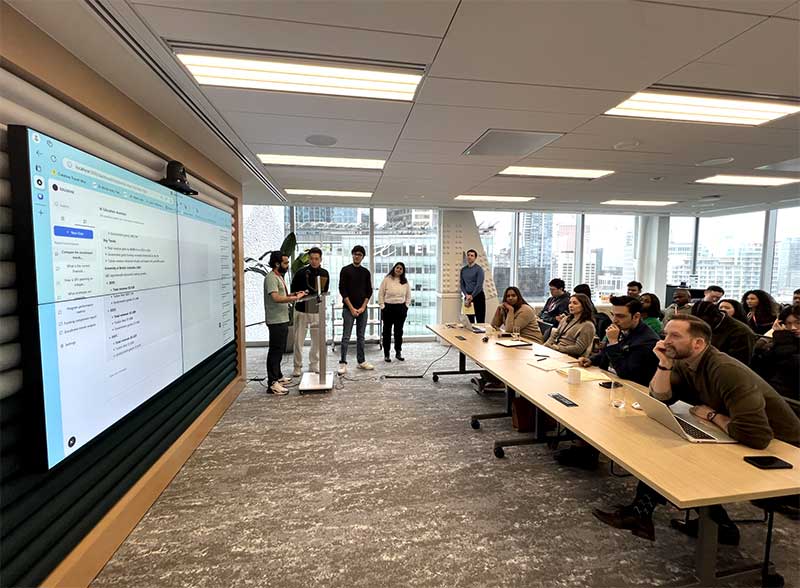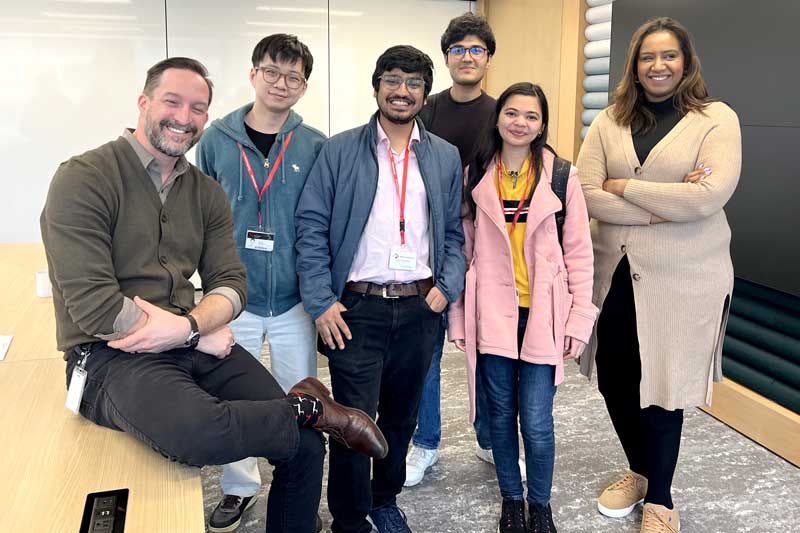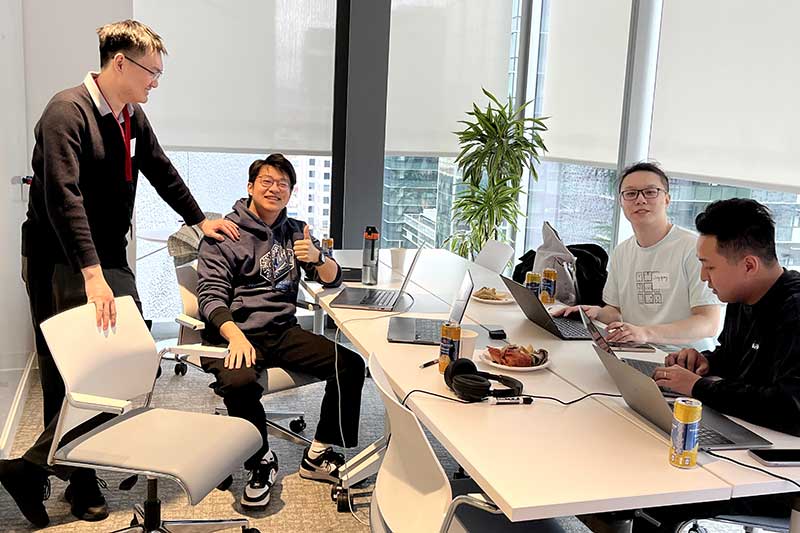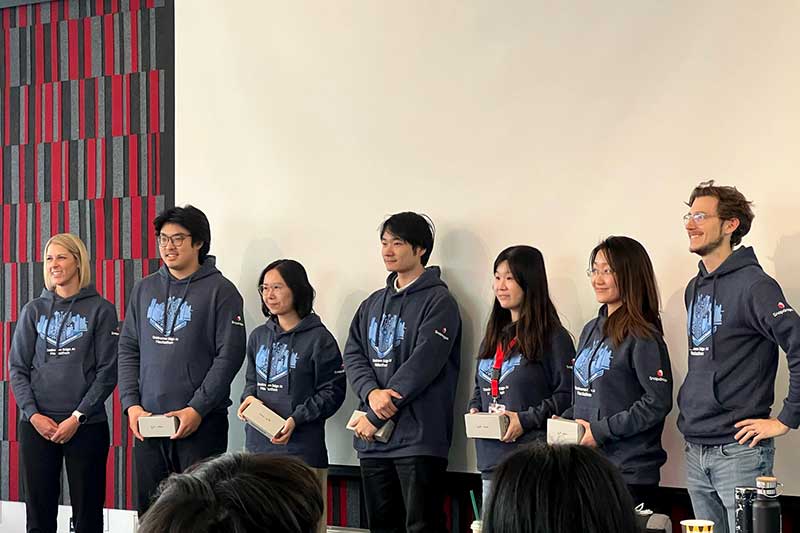Khoury News
Corporate partners, student creativity drive hackathons in Seattle and Vancouver
Northeastern's Pacific Northwest campuses wanted to help students stand out to employers. In partnering with Qualcomm, Microsoft, and Deloitte to put on hackathons with different themes and challenges, that's exactly what they did.

In March, Northeastern University’s Seattle and Vancouver campuses hosted three industry-sponsored hackathons. Each one was sponsored by an industry partner: Qualcomm Technologies at both campuses with additional support from Microsoft, and Deloitte for Vancouver.
Ildar Akhmetov, an associate teaching professor at Khoury College and the director of computing programs for Vancouver, notes that coursework and the classroom are just one slice of students' education, and that “they need to stand out to be needed by the industry.” Hackathons serve as a way for students to access external opportunities and build projects for their portfolio. However, Akhmetov notes that it’s not always easy for students to join their first hackathon without any on-ramps or initial introductions — experiences the sponsored hackathons provided.
“It’s important to bring some of the hackathons to campus, in the building students know, with the support of faculty, while giving students opportunities to get to know staff from big industry names,” he says.
Each hackathon provided unique challenges and constraints, with partners providing their own spin based on their needs. Qualcomm required students to implement edge AI applications on a Snapdragon X Elite Copilot+ PC laptop (provided by Qualcomm and Microsoft) locally and offline, with no access to online models like ChatGPT. The hackathon spanned 24 hours on a Saturday and Sunday, with teams submitting proposals a week beforehand and Qualcomm selecting the top 35 to participate.
In contrast, Deloitte’s constraint was thematic, with a focus on higher education solutions in British Columbia. This hackathon took place over a week. Teams prepared for an initial presentation to judges on Wednesday and the top six advanced to a final pitch on Friday.
“Students could tell how much Qualcomm and Microsoft cared,” says Dominik Beckers, director of strategic partnerships at the Vancouver campus. “Food for the weekend was provided, as well as a two-hour restaurant social at the end. Winning teams received smart glasses, and the top teams will continue to work with Qualcomm on their applications. Students felt really taken care of.”
With Deloitte’s weeklong hackathon, Beckers says, “It was a different feel. Students loved presenting and pitching in front of Deloitte partners and faculty combined, and it was important to see how they improved from Wednesday’s pitch to the Friday finals.”
For computer science master’s student Kalhar Pandya, that improvement boosted his team to first place in the Deloitte-sponsored hackathon in Vancouver. His team created a comprehensive AI-powered vision board creator to help users turn their visions into reality with strategic insights, integrating with existing tools like Gmail and Google Drive. Using more than 50 AI agents simultaneously, they differentiated themselves from existing platforms.

“We knew we didn’t want to replicate ChatGPT,” Pandya says. “We needed to find something ahead of that, something that’s not out there already.”
Pandya’s team included students from computing and noncomputing backgrounds, providing different perspectives and concepts.
“We had coaches that guided us in the right direction and helped us communicate what we were trying to do,” he says.
Both Northeastern faculty and Deloitte staff were eager to help students prepare, and provided crucial feedback as the jury for the competition.
“They are very supportive of ideas and they encouraged everyone,” Pandya adds.
The team that won the Qualcomm hackathon in Vancouver reported a similarly positive experience. Dingyang Jin, an Align master’s student in computer science and a member of the winning team, has participated in many hackathons, and this was his third with Northeastern. His team built an AI model to help wheelchair-bound, visually impaired users navigate through space using computer vision technology. The software ran on the Qualcomm laptop without access to the internet, which created challenges for the team.
“It took a whole day to configure it,” Jin says. “Our proposal is complicated and we needed to combine different AI tools to make it work: AI for vision detection and a text-to-speech model which would speak out the object detection system’s result.”

When the object detection system, commonly known as YOLO for “you only look once,” sees a person in front of the wheelchair, it will say aloud that there is a person in front and will describe how many meters away that person is. Another version that the team developed connects to a large language model that provides more specific scene description.
Jin, who earned his master’s degree in business analytics from Northeastern before pursuing a master’s in computer science, is proud of how his team drew on each member’s strengths and background.
“I love challenging myself and working with these teammates in a competition. I enjoy the process,” he says. “I had worked with two of them before in other hackathons. I’m lucky to have talented teammates.”
Jin also enjoyed the presentation experience, in which his team used a laptop-mounted camera to scan for people in the audience as they showcased their large language model.
“My biggest takeaway was learning how to integrate advanced computer vision and speech recognition technologies into a real-time device solution with zero reliance on cloud solutions,” Jin explains. “This is critical to hardware and algorithms that solve real-world problems.”
The team plans on making a better version with a front end and improved voice activation for vision-impaired people, and will continue working with Qualcomm toward that.
At the Seattle Qualcomm hackathon, the winning project was “Fitmirror,” an on-device fitness coach that helps people analyze their exercise movements and make improvements.
“Participating in the hackathon taught me and my teammates how to build and deliver a working AI-powered solution under intense time constraints,” says Yiyi Wang, a master’s student in computer science and a member of the winning team. “We constantly had to think about usability, not just functionality. We gained confidence in turning ideas into action and clearly presenting them to judges.”

Beckers notes the importance of hackathons goes beyond student experiential learning, pitching practice, and portfolios.
“For the industry partner, we want to make sure they have a proof of concept at the end that they can develop or deploy,” he says. “For Qualcomm, this is the basis of a larger partnership. We started with Vancouver and Seattle, but we’ll expand to other campuses to make it a global network hackathon.”
When Beckers joined Northeastern several years ago, industry people he spoke with were unfamiliar with Northeastern. That’s different now.
“People know who we are and what we stand for — experiential learning, building community around technology, and becoming a tech hub in downtown Vancouver,” he says. “Hackathons are a great way to [start a partnership]. It happens with companies who might have worked with co-ops or alumni, wanting to deepen their relationship and partnership with Northeastern. It’s a lot of word of mouth. We’ve become known for experiential learning and for high-caliber students working on projects.”
Khoury College’s capstone projects are vital in this effort, since they showcase students’ technical skills and diversity of backgrounds, especially in the Align program.
“Companies like Deloitte love that, when they find people who were accountants or consultants who can now approach things from a technical level,” Beckers says.
“It creates some very powerful synergies,” Akhmetov adds. “We really want to have students who can do things that aren’t just coding. We opened the hackathons up to all colleges at Northeastern Seattle and Vancouver, not just Khoury College. This is where diversity of knowledge, experiences, and skills really shines.”
The Khoury Network: Be in the know
Subscribe now to our monthly newsletter for the latest stories and achievements of our students and faculty